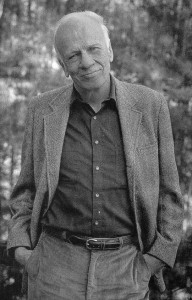 Walker Percy was born in May 1916 in Birmingham, Alabama. His father's roots trace back to the Percys who appear in Shakespeare's plays, and his mother's to French Catholics. His family was prominent in Birmingham, with Percy's father and grandfather both having practiced law there. The Percy family was pretty well-off but lived by their secular version of the Biblical claim that "to whom much is given, of him much will be required." The Percy family was thus opposed to living in luxury and aimed to live with the common people. They were active in community matters, particularly through involvement in civic clubs and as members of the Independent Presbyterian Church, a congregation led by a humanist pastor who did not believe in miracles nor the divinity of Jesus.
Walker Percy was born in May 1916 in Birmingham, Alabama. His father's roots trace back to the Percys who appear in Shakespeare's plays, and his mother's to French Catholics. His family was prominent in Birmingham, with Percy's father and grandfather both having practiced law there. The Percy family was pretty well-off but lived by their secular version of the Biblical claim that "to whom much is given, of him much will be required." The Percy family was thus opposed to living in luxury and aimed to live with the common people. They were active in community matters, particularly through involvement in civic clubs and as members of the Independent Presbyterian Church, a congregation led by a humanist pastor who did not believe in miracles nor the divinity of Jesus.Percy attended a select academy for his schooling and was very studious. He was described as "too vulnerable and frail a creature to be suited for the rough and tumble of ordinary life," a trait seen as derived from his mother. He was not involved in sports and rather chose to write short stories for magazines.
His family moved out of Birmingham and to a suburb in Alabama when Percy was 8 years old. At this time, his father began to experience extreme mood swings and to become obsessive. His father encouraged extreme competition among Percy and his brothers, and the family became very unhappy. Percy's father committed suicide when we was 13 years old, and he did not get to attend the funeral as he was at summer camp. Later in his life, Percy admitted the huge impact his father's suicide had on him throughout his life, as he constantly asked why his father killed himself. It is interesting to note a familial history of suicide, thought to be driven by a sense of "failed honor" at not having achieved the honor held by Percy ancestors.
Percy was soon impacted again by the death of his mother, thought by some to have also been a suicide attempt. Left orphaned, Percy and his brothers were taken in by their father's cousin Will. Later in life, Percy said of Uncle Will “that he was the most extraordinary man I have ever known and that I owe him a debt which cannot be paid.” This praise was well-deserved, as Percy's Uncle Will was rather distinguished and raised Percy and his brothers quite well, as to make them men of culture and of ambition. He encouraged them to follow the classic professions, excluding the ministry. Uncle Will was raised Catholic and had considered entering the Priesthood when he was a child but later gave up this faith, including his Christianity, as a believer in secular humanism. Uncle Will's beliefs in secular humanism, in addition to his parental raising in the Independent Presbyterian Church, struck a chord with Percy at this time in his life. He was neither a Catholic nor a Christian, but would prove to convert to Catholicism later in life as a result of his future experiences, to be highlighted in the upcoming blog posts.
Source:
Wood, Ralph C. "An Introduction to Walter Percy." CTools. Web. 26 Mar 2012.
I was shocked to learn Walked overcame such adversity to become and accomplished writer. I think Walkers close experiences with death influenced him to question the purpose for life. I have been blessed not to have experienced such devastating loss in my life but I can see how the loss of both parents would change his outlook on life. These losses may have helped him write his later works about the true meanings of life
ReplyDeleteI have to agree. Both Percy's father and grandfather committed suicide, and whether or not his mother did as well is up to debate. I think we see the impact of these deaths on him in The Moviegoer, and especially in Kate, who attempts suicide herself. His own personal experiences likely impacted how he wrote about Kate and Binx's relationship. Perhaps his own experience is the reason why Binx takes over as a protector for Kate after her attempted suicide, as he understands the pain and suffering that can ensue a suicide, as well as the need for a protector to get through it.
DeleteI think it's interesting that despite having experienced tumultuous suffering, Percy writes so poignantly on the "everydayness" of life. Perhaps his situation mirrors that of Binx. Like the deaths of Percy's parents, Binx witnesses terrible tragedies and horrors in the Korean War. But then life returns to normal and he is ridden with malaise. Makes me wonder if that's how things were for Percy too. Once this became "normal" or as normal as they could ever really be, maybe he struggled with the same sense of suffocating nothingness that Binx goes through?
ReplyDelete